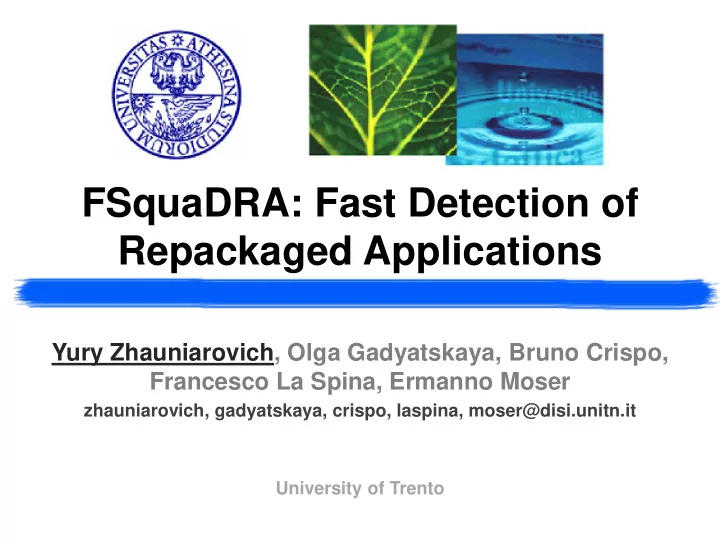

FSquaDRA: Fast Detection of Repackaged Applications Yury Zhauniarovich, Olga Gadyatskaya, Bruno Crispo, Francesco La Spina, Ermanno Moser zhauniarovich, gadyatskaya, crispo, laspina, moser@disi.unitn.it University of Trento
Repackaging Developer Rebranding certificate (good) (same) Android Package (.apk) .dex resources. files arsc Device uncompiled resources Signing assets AndroidManifest.xml Adversary Plagiarizing Developer certificate (bad) signature (different) 2
Motivation App repackaging is very easy on Android: – Fetch an app Disassemble Change Assemble Sign with own certificate Publish The code of the application can be easily changed – smali/backsmali, AndroGuard, dex2jar, apktool, etc. Plagiarizing is used to: – steal advertising revenues (14% of ad revenues)* – collect user database (10% of user base)* – malware distribution (86% of Android malware samples use this distribution channel)** * C.Gibler et al. “ Adrob: examining the landscape and impact of Android application plagiarism”. In Proc. of MobiSys ’13 ** Y. Zhou, X. Jiang. “Dissecting Android malware: Characterization and Evolution”. In Proc. of S&P ’12 3
Problem Statement Issue: How to detect repackaged Android applications fast – 1.1+ million apps on Google Play * – 190+ third-party markets ** – quadratic complexity in effective way? – need for a similarity metric to what extent one app is similar to another * N. Viennot et al. “A Measurement Study of Google Play”. In Proc. of SIGMETRICS ‘14 ** T. Vidas, N. Christin . “Sweetening Android Lemon Markets: Measuring and Combating Malware in Application Marketplaces”. In Proc. of CODASPY ‘13 4
FSquaDRA: Idea Repackaged apps want to maintain the “look and feel” of the originals – Opera Mini fake: 230 of 234 files are the same IDEA: compare apps based on the included resource files ( same files same apps ) 5
FSquaDRA: Approach Compute hashes of all files inside two apps Calculate Jaccard index for the extracted hashes: H i – set of hashes of files in apk i Compare the obtained value with a threshold PROBLEM: How to compute hashes efficiently? 6
Speeding Up Hash Calculations As a part of application signing process SHA1 digest of each file inside apk is calculated 7
FSquaDRA: Evaluation Dataset: – 55779 apk samples – from 8 markets including Google Play Pairwise comparison of all apps in the dataset Objectives: – plagiarizing rates for apps signed with different certificate – rebranding rates for apps signed with the same certificate Evaluate Efficiency and Effectiveness 8
Evaluation: Pairwise Comparison 9
Evaluation: Efficiency FSquaDRA is implemented as a single- threaded Java program – not really optimized We ran experiments on a commodity laptop (2.9 GHz Intel Core i7, 8GB RAM) – 15,10 hours to load hashes into memory – 64,41 hours to compute similarity score for all app pairs On average 6700 app pairs per second 10
Evaluation: Effectiveness Metrics: – False Positives? For apps FSquaDRA considers repackaged, are they actually repackaged? – False Negatives? For apps FSquaDRA considers different, are they really not repackaged? Approaches: – analyze FSquaDRA on a dataset of repackaged apps – compare FSquaDRA metrics with the state-of-the-art tools Problems: – no public dataset with repackaged apps – only one public tool: AndroGuard 11
Effectiveness: Evaluation Setup AndroGuard – open-source tool by A. Desnos: – computes code-based similarity metric – slow (65 sec to compare an app pair on average) – does not produce symmetric values We use average score of (A,B) and (B,A) as the similarity score for AndroGuard (ags) For each selected bin: – randomly picked 100 app pairs with different certificates and 100 app pairs with the same certificate; – calculated their AndroGuard similarity score (ags) – compared with FSquaDRA similarity score (fss) 12
Effectiveness: Plagiarizing Results (different certificates, fss>0) Correlation: 0.7919 Difference (fss-ags): -mean: -0.0412 -st. dev.: 0.1862 -median: -0.0480 Red: line of best fit Blue: LOWESS (locally weighted scatterplot smoothing line) 13
Effectiveness: Rebranding Results (same certificates, fss>0) Correlation: 0.5807 Difference (fss-ags): -mean: -0.2761 -st. dev.: 0.2704 -median: -0.2518 Red: line of best fit Blue: LOWESS (locally weighted scatterplot smoothing line) 14
FSquaDRA: Features The first solution detecting repackaged apps based on resource files Our resource-based similarity score is highly correlated with the code-based similarity score of AndroGuard ( 0.79 for plagiarizing, 0.58 for rebranding) Faster than any known competitor – DNADroid by J. Crussell et al. (ESORICS 2012) - 0.012 app pair/sec • PDG subgraph isomorphism • Hadoop MapReduce framework with a server and 3 desktops – Juxtapp by S. Hanna et al. (DIMVA 2012) - 49.4 app pair/sec • k -grams of opcodes hashing feature vector Jaccard distance • Intel Xeon CPU (8 cores) , 8GB of RAM – Our approach - 6700 app pair/sec Open-source * * https://github.com/zyrikby/FSquaDRA 15
FSquaDRA: Future Work The proposed solution is not sustainable: – attackers can change a bit in all files in apk – adversaries can add a lot of new resources to decrease the similarity score – libraries containing resources may influence the similarity score No clear values for false positive and false negative scores – absence of publicly available dataset – almost all already developed tools (except AndroGuard) are not available 16
THANK YOU zhauniarovich@disi.unitn.it 17
Recommend
More recommend